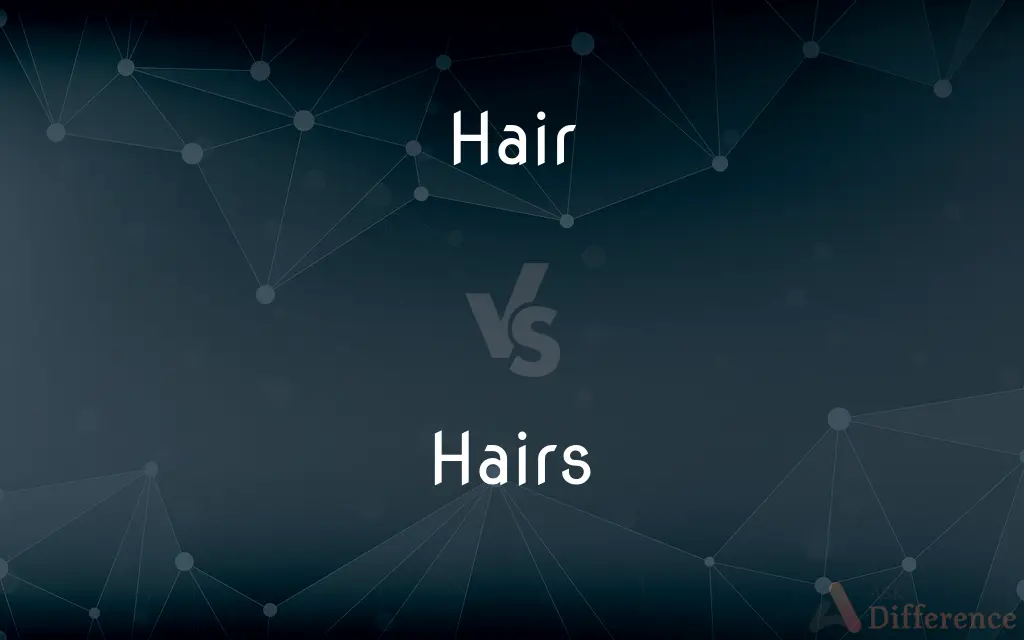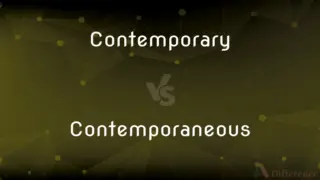Hair vs. Hairs — What's the Difference?
Edited by Tayyaba Rehman — By Fiza Rafique — Updated on April 27, 2024
"Hair" refers to the collective strands covering human heads or bodies, implying entirety, while "hairs" denotes individual strands, focusing on specifics.

Difference Between Hair and Hairs
Table of Contents
ADVERTISEMENT
Key Differences
Hair" is used as a mass noun to describe the complete set of hair on a part of the body, typically the human scalp. In contrast, "hairs" highlights individual strands, often when attention is drawn to specific ones for descriptive or illustrative purposes.
For instance, one might speak generally of someone's hair being curly, whereas references to finding hairs in one's soup are more immediate and particular.In describing physical appearance, "hair" often conveys a broader, more abstract understanding, such as discussing hair color or texture. On the other hand, "hairs" can be useful in contexts where detail is key, such as forensic science or beauty treatments focusing on specific problems like split ends.
When discussing quantity, "hair" generally does not accommodate pluralization, as it refers to an unspecified amount of hair collectively. However, "hairs" is explicitly plural, used when the number or the distinction between strands matters, such as counting hairs or noting a few gray hairs among the rest.
In literature and everyday language, "hair" can be metaphorical or symbolic, often used to express concepts like youth or vitality. Whereas "hairs" is rarely employed metaphorically and is more likely to be used in literal or clinical observations.
Care instructions or products typically use "hair" to suggest their suitability for all hair types or treatments, implying a universal application. Meanwhile, "hairs" might appear in discussions about specific hair issues or the effects of products on individual strands, emphasizing a more targeted approach.
ADVERTISEMENT
Comparison Chart
Definition
Refers to all the strands as a whole
Refers to individual strands
Usage
Used as a mass noun
Used in plural form
Context
General, abstract discussions
Specific, detailed discussions
Implication
Implies entirety and collective attribute
Highlights particularity and individuality
Common Phrases
“Her hair is so shiny.”
“There are a few gray hairs.”
Compare with Definitions
Hair
A mass noun for the collective strands on humans or animals.
Her hair glows beautifully in the sunlight.
Hairs
Plural form, focusing on individual strands.
The detective found blond hairs at the crime scene.
Hair
Often associated with health or aesthetic value.
She uses a special shampoo for her hair.
Hairs
Used when specific strands are discussed.
There are only a few gray hairs in his beard.
Hair
Hair is a protein filament that grows from follicles found in the dermis. Hair is one of the defining characteristics of mammals.
Hairs
Rarely used metaphorically.
The book describes the character meticulously plucking out white hairs.
Hair
Any of the fine threadlike strands growing from the skin of humans, mammals, and some other animals
Thick black hairs on his huge arms
Coarse outer hairs overlie the thick underfur
Hairs
Indicates a countable perspective.
She found three hairs in her soup.
Hair
Hairs collectively, especially those growing on a person's head
Her shoulder-length fair hair
Hairs
Important in forensic and detailed descriptive contexts.
The brush was covered in cat hairs.
Hair
A very small quantity or extent
His magic takes him a hair above the competition
Hairs
Any of the cylindrical, keratinized, often pigmented filaments characteristically growing from the epidermis of a mammal.
Hair
Any of the cylindrical, keratinized, often pigmented filaments characteristically growing from the epidermis of a mammal.
Hairs
A growth of such filaments, as that forming the coat of an animal or covering the scalp of a human.
Hair
A growth of such filaments, as that forming the coat of an animal or covering the scalp of a human.
Hairs
A filamentous projection or bristle similar to a hair, such as a seta of an arthropod or an epidermal process of a plant.
Hair
A filamentous projection or bristle similar to a hair, such as a seta of an arthropod or an epidermal process of a plant.
Hairs
Fabric made from the hair of certain animals
A coat of alpaca hair.
Hair
Fabric made from the hair of certain animals
A coat of alpaca hair.
Hairs
A minute distance or narrow margin
Won by a hair.
Hair
A minute distance or narrow margin
Won by a hair.
Hairs
A precise or exact degree
Calibrated to a hair.
Hair
A precise or exact degree
Calibrated to a hair.
Hairs
Plural of hair
Hair
(countable) A pigmented filament of keratin which grows from a follicle on the skin of humans and other mammals.
Hair
(uncountable) The collection or mass of such growths growing from the skin of humans and animals, and forming a covering for a part of the head or for any part or the whole body.
In the western world, women usually have long hair while men usually have short hair.
Hair
A slender outgrowth from the chitinous cuticle of insects, spiders, crustaceans, and other invertebrates. Such hairs are totally unlike those of vertebrates in structure, composition, and mode of growth.
Hair
A cellular outgrowth of the epidermis, consisting of one or of several cells, whether pointed, hooked, knobbed, or stellated.
Internal hairs occur in the flower stalk of the yellow frog lily (Nuphar).
Hair
(countable) Any slender, flexible outgrowth, filament, or fiber growing or projecting from the surface of an object or organism.
Hair
A locking spring or other safety device in the lock of a rifle, etc., capable of being released by a slight pressure on a hair-trigger.
Hair
(obsolete) Haircloth; a hair shirt.
Hair
(countable) Any very small distance, or degree; a hairbreadth.
Just a little louder please—turn that knob a hair to the right.
Hair
Complexity; difficulty; the quality of being hairy.
Hair
(transitive) To remove the hair from.
Hair
(intransitive) To grow hair (where there was a bald spot).
Hair
(transitive) To cause to have or bear hair; to provide with hair
Hair
To string the bow for a violin.
Hair
The collection or mass of filaments growing from the skin of an animal, and forming a covering for a part of the head or for any part or the whole of the body.
Hair
One the above-mentioned filaments, consisting, in vertebrate animals, of a long, tubular part which is free and flexible, and a bulbous root imbedded in the skin.
Then read he me how Sampson lost his hairs.
And draweth new delights with hoary hairs.
Hair
Hair (human or animal) used for various purposes; as, hair for stuffing cushions.
Hair
A slender outgrowth from the chitinous cuticle of insects, spiders, crustaceans, and other invertebrates. Such hairs are totally unlike those of vertebrates in structure, composition, and mode of growth.
Hair
An outgrowth of the epidermis, consisting of one or of several cells, whether pointed, hooked, knobbed, or stellated. Internal hairs occur in the flower stalk of the yellow frog lily (Nuphar).
Hair
A spring device used in a hair-trigger firearm.
Hair
A haircloth.
Hair
Any very small distance, or degree; a hairbreadth.
Hair
Dense growth of hairs covering the body or parts of it (as on the human head); helps prevent heat loss;
He combed his hair
Hair
A very small distance or space;
They escaped by a hair's-breadth
They lost the election by a whisker
Hair
Filamentous hairlike growth on a plant;
Peach fuzz
Hair
Any of the cylindrical filaments characteristically growing from the epidermis of a mammal;
There is a hair in my soup
Hair
Cloth woven from horsehair or camelhair; used for upholstery or stiffening in garments
Hair
A filamentous projection or process on an organism
Hair
Used to describe the overall quality or style.
He has curly hair.
Hair
Can be symbolic or metaphorical.
His hair represents strength in the story.
Hair
Typically uncountable when discussing human features.
Hair loss is a common concern among adults.
Common Curiosities
Is it correct to say 'a hair' in English?
Yes, it is correct when referring to a single strand, emphasizing its singularity among others.
What is the primary difference between 'hair' and 'hairs'?
'Hair' refers to the collective strands as a whole, used as a mass noun, while 'hairs' refers to individual strands, emphasizing specifics.
Can 'hair' be used in plural form?
No, 'hair' is typically used as a mass noun and does not have a plural form, unlike 'hairs' which is explicitly plural.
What type of noun is 'hair'?
'Hair' is typically used as a mass noun, which means it refers to an uncountable substance or entity when talking about the collective hair on humans or animals.
How do beauty and hair care industries differentiate between 'hair' and 'hairs'?
In beauty and hair care, 'hair' is used to discuss products or treatments suitable for hair in general, while 'hairs' might be referenced when addressing issues affecting specific strands, like split ends.
In what contexts might 'hairs' be more appropriate than 'hair'?
'Hairs' is more appropriate in contexts requiring attention to detail, such as forensic analysis or when individual strands are notable.
How do metaphors differ when using 'hair' vs. 'hairs'?
'Hair' can be used metaphorically to symbolize concepts like youth or health, whereas 'hairs' is generally used more literally.
Why do people often use 'hair' to refer to someone's hairstyle or color?
'Hair' is used in a general sense to describe characteristics like style, color, or texture, encompassing the entire head of hair or another body part without focusing on individual strands.
Is 'hairs' common in everyday conversation?
'Hairs' is less common in everyday language, primarily used when specific strands are relevant to the context, such as in detailed descriptions or forensic discussions.
What implications does using 'hair' vs. 'hairs' have in scientific contexts?
In scientific or medical contexts, 'hair' might refer to the biological study of hair as a human or animal feature, while 'hairs' could be used to discuss findings that pertain to individual hair strands, such as in genetic testing or microscopic analysis.
Share Your Discovery

Previous Comparison
Shisha vs. Hookah
Next Comparison
Contemporary vs. ContemporaneousAuthor Spotlight
Written by
Fiza RafiqueFiza Rafique is a skilled content writer at AskDifference.com, where she meticulously refines and enhances written pieces. Drawing from her vast editorial expertise, Fiza ensures clarity, accuracy, and precision in every article. Passionate about language, she continually seeks to elevate the quality of content for readers worldwide.
Edited by
Tayyaba RehmanTayyaba Rehman is a distinguished writer, currently serving as a primary contributor to askdifference.com. As a researcher in semantics and etymology, Tayyaba's passion for the complexity of languages and their distinctions has found a perfect home on the platform. Tayyaba delves into the intricacies of language, distinguishing between commonly confused words and phrases, thereby providing clarity for readers worldwide.














































